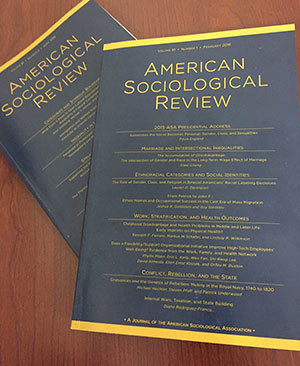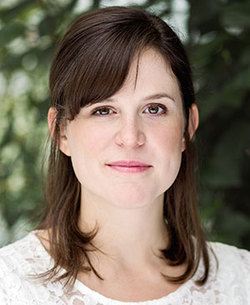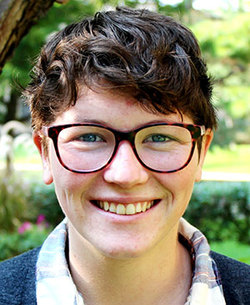 The February and April 2016 issues of the American Sociological Review, the first two installments of the discipline’s top journal to be edited by Notre Dame sociologists.
The February and April 2016 issues of the American Sociological Review, the first two installments of the discipline’s top journal to be edited by Notre Dame sociologists.
Notre Dame sociology graduate students are getting a rare inside look at the academic publishing process—and valuable experience that will give them an edge in their own research and careers.
The students serve as assistant and coordinating editors of the American Sociological Review (ASR)—the flagship journal of the American Sociological Association (ASA)—under the direction of Professor Omar Lizardo, Professor Rory McVeigh, and Professor Sarah Mustillo.
The three faculty members were chosen by the ASA to lead the journal for a three-year term beginning in January 2016, with an option to extend the term for an additional two years.
“One of the most exciting things about having ASR at Notre Dame is that it provides many of our graduate students with a ‘behind-the-scenes’ view of the process of getting research published in the discipline’s top journal,” McVeigh said. “Students who work closely with the journal are able to gain a clear sense of the high bar that they must reach with their own research.”
Even those students who do not work directly for the journal may have opportunities to review selected papers or help identify other reviewers, McVeigh said.
“Approaching a research paper as an evaluator, rather than an author,” he said, “forces students to think carefully about what distinguishes the very best research in the discipline from research that may be solid, but not groundbreaking enough for ASR.”
An Inside Track
 Mary Kate Blake
Mary Kate Blake
Ph.D. candidate Mary Kate Blake began working on the journal in the spring 2016 semester. As an assistant editor, she helps identify professionals in the field who can review articles submitted for publication.
“This experience is so valuable to me. I get to see the most cutting-edge research coming into ASR,” Blake said. “And while it’s not required, I can look at the article and read it myself. I can even track articles that have come through to see how they’ve been revised and resubmitted and what kind of feedback editors and reviewers give.”
The journal’s move to Notre Dame also reflects the quality of the University’s sociology program and its reputation in the field, Blake said.
“In the five years I’ve been here, the program has grown by leaps and bounds,” she said. “And, the three editors have all published leading journals in the field. Their work is so important and influential that I’m not at all surprised their bid for the journal was successful.”
A Broader Map
Notre Dame’s term officially began with the publication of the February 2016 issue, but the team started work in summer 2015 on submissions for the first issue they were overseeing.
Will Cernanec, a second-year Ph.D. student, has been involved from the beginning. He now serves as a coordinating editor, shepherding articles submitted to the journal through each stage of the review process.
He said working with the faculty editors has not only given him a better understanding of the publishing process, it’s laid out a “broad map of the field” of sociology.
“Most people don’t get exposed to the review process until they submit a paper to a journal for the first time,” Cernanec said. “But working with Rory, Sarah, and Omar, we can see their mindset for what a good paper is. As editors of ASR, they have a good understanding of—and more influence on—the field as a whole and where it is going.”
 Paige Ambord
Paige Ambord
Seeing that big picture will help graduate students improve their own work, said Paige Ambord, a first-year Ph.D. student and assistant editor for ASR.
“The journal has given me access to different subfields and more familiarity with how they fit together,” she said. “I think it’s going to help me bring other influences into my research from fields I wouldn’t have considered otherwise.”
A Competitive Edge
Throughout their term leading the journal, the faculty editors hope to rotate graduate students into positions with the journal, allowing for as much involvement as possible.
While his job search is still a few years away, Cernanec said the experience ultimately will give him an edge.
“When you’re on the job market, one of the biggest things institutions consider is your publication record,” he said. “So understanding the inner workings of the publication process can only help.”
Originally published by Carrie Gates at al.nd.edu on April 22, 2016.